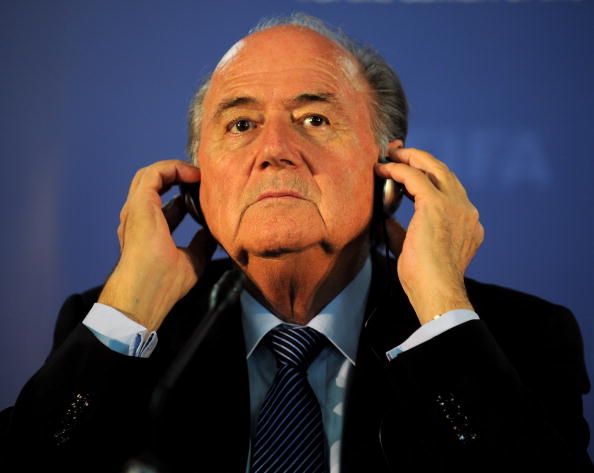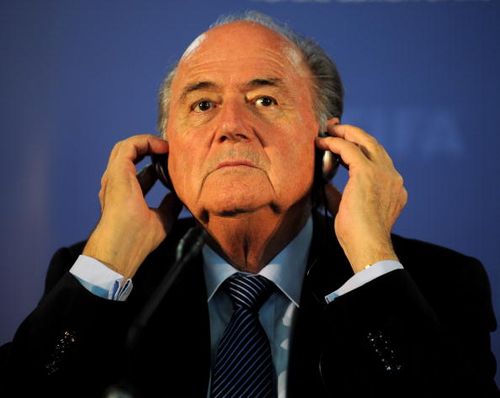
Does FIFA need to elect its first black president to fight racism?

After reading Sepp Blatter’s latest comments regarding racism in football, one begins to wonder if he dreamt up the lines “zero tolerance of racism in stadiums ” when he spoke to the National paper in UAE.
Reacting to AC Milan player Kevin-Prince Boateng’s decision to abandon a friendly game last week, after he was racially abused by a section of Pro Patria fans, Blatter said: ”Walk off? No. I don’t think that is the solution. I don’t think you can run away, because then the team should have to forfeit the match.”
A player bravely walked off the pitch risking a fine and Blatter interpreted it as running away. He is more concerned about the team forfeiting the match than expressing solidarity to Boateng.
Now in his fourth term as FIFA president, Sepp Blatter has so far brushed the racism issue under a doormat and rubbed his feet on it. If the anti-racism campaigners are dreaming of FIFA sending out a strong message by making an example of some country, club or player, then it will not happen while Blatter is in office.
In FIFA’s 108 years history, eight presidents were elected and seven of them are Europeans, with Blatter’s predecessor Joao Havelange being the only Latin American.
By the time Russia hosts the World Cup in 2018, Blatter may not seek another term. Racism will take center stage during the World Cup due to Russia’s poor image in dealing with racism in club football. In times like these, FIFA needs a president who will show some spine against racism, and not someone who will look the other way.
It is time for FIFA to elect its first black president and preferably someone with considerable experience in football.
It’s true that having a black president may not solve all the problems, but at least he will empathize with victims of racism instead of making ludicrous statements like “there is no racism in football”.
The next presidential election will be after the 2014 World Cup in Brazil and it has always been a dodgy affair after allegations were levelled against Blatter that he gave cash in exchange for votes.
Vote bank politics cannot be ruled out in FIFA’s or UEFA’s inaction while dealing with racism on and off the field. FIFA has 209 national associations as members and UEFA has 53 members. Every national association’s vote counts during a presidential election. Perhaps it is more important for both Blatter and Michael Platini (president of UEFA) not to offend any erring football associations with fines and sanctions and risk losing support.
There is no better example of UEFA’s apathy towards racism in football than them fining Nicklas Bendtner £80,000 for showing his underpants that carried an advertisement and issuing a £25,000 fine to both Russia and Spain during last year’s Euro Championships because their fans abused the opposition players.
Similar to its parent organisation, UEFA president Platini is also against players walking off the pitch if racially abused by fans or another player. He warned Italy’s first black international participating in the Euro’s, Mario Balotelli, against walking off the pitch last summer.
UEFA’s handling of the ugly incidents that marred Serbia-England match, where an English player, Danny Rose, was racially abused by the crowd and players, is enough evidence to show why UEFA drags its feet.
Both Blatter and Platini have insisted that the referee will act as an adjudicator for race related issues on the field and only he could call off a game. Their fierce determination to ensure that the game must carry on at all times, regardless of the scenario, is commendable but this must be backed with strong action later on.
Telegraph football correspondent Henry Winter recently wrote that Boateng’s protest could be tipping the scales against FIFA. This “moment is becoming a movement” and could potentially weaken FIFA’s power if it doesn’t address the issue sooner rather than later. Boateng could have potentially inspired other players to follow suit or maybe given an excuse for players to abandon a losing match.
Calls for tighter laws to fight racism is the usual norm but it is a silly endeavour, knowing FIFA’s callous attitude towards racism in football. However, things could change after Blatter steps down. In 2011, US president Barack Obama received a birthday card from a 75-year-old Blatter wishing the former a happy 50th birthday. In another four years time, Obama could be getting one from FIFA’s first black president.